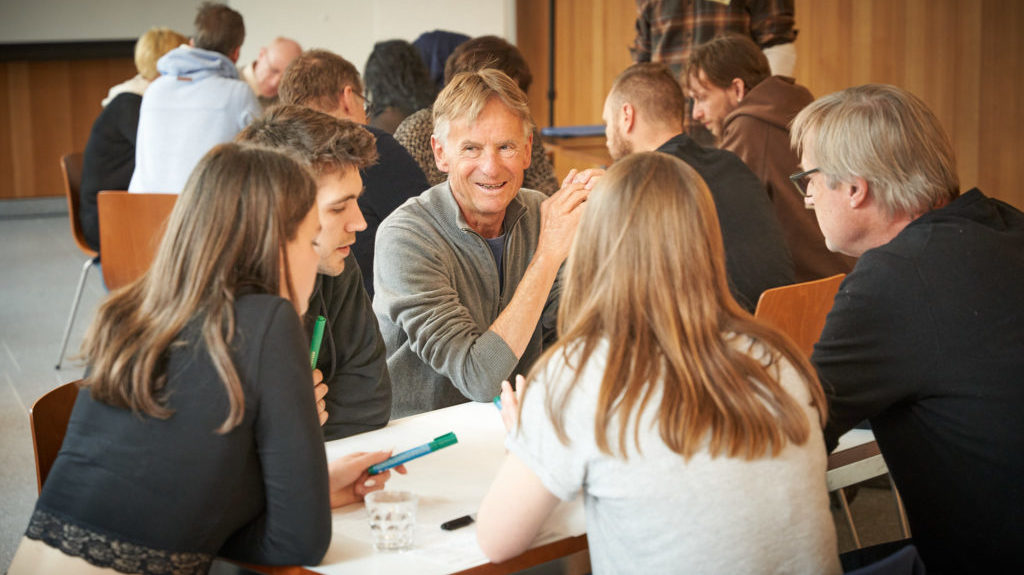Voting assistance by randomly selected citizens

On 18 June 2023, the Swiss voted on climate protection in their country. In the city of Bellinzona, voters received ballot information with the most important pro and con arguments formulated by randomly selected citizens.
In Switzerland, referendums are a central pillar of democracy. Three to four times a year, citizens have the opportunity to cast their vote at communal, cantonal and federal level. In this way, they decide directly on important political proposals.
A democratic challenge
According to the website of the democracy project "Demoscan", it takes time and is a (democratic) challenge for many people to inform themselves about sometimes extremely complex proposals and to form their own opinion.
Various studies showed that the official voting documents were too complicated for many voters or that they did not feel confident enough to vote. In addition, voting campaigns today are conducted in a more emotional way, which makes it even more difficult to form neutral opinions.
Strengthening the formation of public opinion
The Demoscan project aims to strengthen public opinion-forming in the run-up to a referendum. Demoscan brings together randomly selected citizens who are as representative as possible. Over the course of four days, they deal intensively with a referendum proposal.
Proponents and opponents of the measure present their arguments and are questioned by the citizens. In addition, independent experts provide information and answer the panel's questions.
Transparency and neutrality
Throughout the process, the panellists deliberate on the information received, the underlying values and the different perspectives. The process is conducted as transparently as possible. Neutrality is guaranteed by a professional and independent moderator.
Towards the end, citizens write a two-page letter with the most important information about the bill, the three most important arguments for the bill and the three most important arguments against the bill. This citizens' letter is then made available to the voting population to help them form their opinion.
Oregon as a model
Such citizens' juries set up in the run-up to referendums are modelled on a procedure that existed in the US state of Oregon from 2008 - 2016 under the name "Citizens' Initiative Review". The procedure is transparent and its neutrality is guaranteed by the impartiality of the moderators. The procedure has already been carried out in several US states, in Finland and in Switzerland.
At the Demoscan Citizens' Jury in Bellinzona, 22 citizens met over two weekends (25/26 March and 1-2 April) ) to discuss the new federal law on climate change targets, innovation and strengthening energy security.
Information gathering and report
"On the first weekend, the members of the Citizens' Jury will have the opportunity to study the issue, hear the opinions of supporters and opponents of the new law and engage in dialogue with a panel of experts," says a statement from the city. "The second weekend, on the other hand, is dedicated to deliberations and the preparation of a report that will be sent to all voters in Bellinzona so that they can form an opinion on the federal vote."
The deliberations of the Citizens' Jury were open to the public. Interested parties could listen in but not participate in the discussions.
Involving non-voters
The main objective of Demoscan is to "involve people who do not normally go to the ballot box and thus increase citizens' interest in political life". This approach has been successful. In the cities where this project has already been tested, the people who received the Citizens' Jury report were, on the one hand, more willing to participate in the voting in question and, on the other hand, they were also better informed about the issue in question.
The participants of the Citizens' Jury in Bellinzona had already been drawn in 2022. After an initial letter was sent to 2,000 randomly selected residents aged 16 and over, 139 of them had made themselves available for the citizens' jury. In a second draw, a group of 22 participants was formed, which is a reflection of the population by taking into account gender, age, education and political views.
Scientific monitoring
For this Demoscan project, the City of Bellinzona has been collaborating with the University of Geneva. The research project was funded by the Swiss National Science Foundation (SNSF) and conducted by a team of scientists led by Professor Nenad Stojanović from the University of Geneva.
The project took place for the first time in November 2019 in the city of Sion. In September 2021, there was a second trial in the canton of Geneva. In addition to Belinzona, the canton of Aargau is another location for the participation procedure in 2023. The procedures in Switzerland are scientifically accompanied by researchers from the Universities of Geneva and Zurich. The aim of the study is to test the effectiveness and usefulness of Demoscan in the Swiss context.
Read more: Demoscan